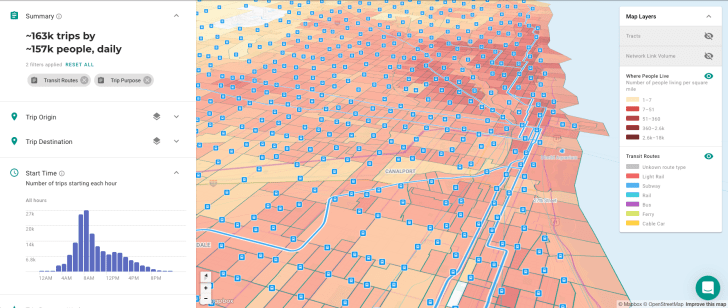Business
Sidewalk Labs spins out urban data-gathering tool Replica into a company


Replica, the data-gathering tool created within Sidewalk Labs that maps the movement of people in cities, is now a company.
The newly formed company, which is headed by Nick Bowden, also announced Thursday it has raised $11 million in a Series A funding round from investors Innovation Endeavors, Firebrand Ventures and Revolution’s Rise of the Rest Seed Fund. The capital will be used to accelerate Replica’s growth through new hires beyond its existing 13-person staff, expansion to new cities and investment in its technology.
Replica will remain connected to Sidewalk Labs, the smart city technology firm owned by Google’s parent company Alphabet. Both Sidewalk Labs and Innovation Endeavors will be on the company’s board.
Replica, which is headquartered in Kansas City, with an engineering office in San Francisco, plans to launch in several new regions. Replica is already working with Kansas City, Portland, Chicago and Sacramento, with more cities to come this year.
The Replica tool, which has drawn the ire of some privacy advocates, grew out of Model Lab, a project started two years ago to investigate modeling as a way to address urban problems. Early work focused on meeting with public agencies throughout the world to learn more about the data, processes and other tools they used.
The Replica planning tool was born out what they discovered: Public agencies don’t have all the information needed to understand the link and interdependence between transportation and land use. The upshot is an incomplete picture of how people move within cities, leaving public agencies ill-equipped to make decisions about how land is used and what transportation is needed and where, the company says.
“Answering questions like who uses the street, in which way and why, are critical for city planners as they work to make transit and land use more efficient and sustainable,” Bowden wrote. “But current resources available to city planners to analyze people’s travel in urban areas are less than satisfactory.”
The Replica modeling tool uses de-identified mobile location data to give public agencies a comprehensive portrait of how, when and why people travel. Movement models are matched to a synthetic population, which has been created using samples of census demographic data to create a broad new data set that is statistically representative of the actual population. The result, Bowden says, is a model that is both privacy-sensitive and extremely useful for public agencies.
Bowden tried to quell privacy worries Thursday in a blog post, emphasizing that the data has been “de-identified,” meaning that an individual’s location data would be identifiable. The company says it’s not interested in the movement of individuals. Instead, the modeling tool is used to see and understand patterns of movement.
“For this reason, we only start with data that has been de-identified,” Bowden wrote Thursday. “This data is then used to train a travel behavior model — basically, a set of rules to represent the movement in a particular place.”
-

 Entertainment7 days ago
Entertainment7 days ago‘Interior Chinatown’ review: A very ambitious, very meta police procedural spoof
-

 Entertainment6 days ago
Entertainment6 days agoEarth’s mini moon could be a chunk of the big moon, scientists say
-

 Entertainment6 days ago
Entertainment6 days agoThe space station is leaking. Why it hasn’t imperiled the mission.
-

 Entertainment5 days ago
Entertainment5 days ago‘Dune: Prophecy’ review: The Bene Gesserit shine in this sci-fi showstopper
-

 Entertainment4 days ago
Entertainment4 days agoBlack Friday 2024: The greatest early deals in Australia – live now
-

 Entertainment3 days ago
Entertainment3 days agoHow to watch ‘Smile 2’ at home: When is it streaming?
-

 Entertainment3 days ago
Entertainment3 days ago‘Wicked’ review: Ariana Grande and Cynthia Erivo aspire to movie musical magic
-

 Entertainment2 days ago
Entertainment2 days agoA24 is selling chocolate now. But what would their films actually taste like?
















